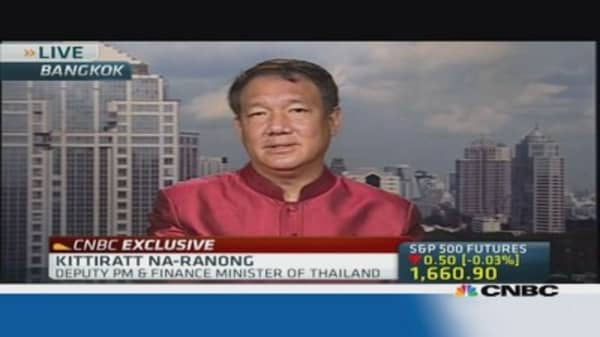Thailand was "ground zero" for the Asian financial crisis in the late 1990s, and the country is once again experiencing slowing growth, a current account deficit and a weakening currency. But the country's finance minister and analysts say, this time around, the country isn't at risk of a major meltdown.
Kittiratt Na-Ranong, the country's finance minister and deputy prime minister, defended Thailand's economic performance on Monday and sounded sanguine despite a shift to a $5 billion current account deficit in the second quarter from a $1 billion surplus in the first quarter.
It's not a chronic deficit, Kittiratt told CNBC. "We have to import more to replace those (machines) and equipment suffering from the flood," he said, referring to the flooding in late 2011 which caused an estimated $40 billion worth of damage.
(Read more: Emerging markets: dissecting the good from bad)
While most emerging markets with current account deficits, such as India and Indonesia, have seen their currencies take a hit from the market turmoil in recent weeks, the Thai baht has weakened only 2.3 percent this month against the dollar. By comparison, India's rupee has tumbled 16 percent and Indonesia's rupiah has weakened 5.5 percent.
Kittiratt said he wasn't concerned about the country's weakening growth.Thailand slipped into technical recession in the second quarter, contracting 0.3 percent from the previous quarter, after the first quarter's 2.2 percent contraction.
(Read more: Credit squeeze in Asia now worst since financial crisis)
Kittiratt argues that seasonal factors were responsible for much of the decline, with April being a holiday month, and the effect being compounded by a cutoff of natural gas imports from Myanmar for more than a week due to maintenance. He points to the second quarter's 2.8 percent year-on-year increase in gross domestic product as more meaningful.




